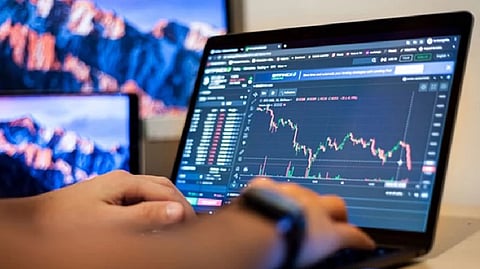

TOKYO: Asian shares were trading mixed Wednesday following a decline on Wall Street after reports on the US economy came in weaker than expected.
Japan's benchmark Nikkei 225 lost 1.3per cent in morning trading to 27,931.00. Australia's S and P/ASX 200 stood little changed, inching down less than 0.1 per cent to 7,235.80. South Korea's Kospi added 0.2 per cent to 2,485.21. Trading was closed in Hong Kong and Shanghai for the Qingming Festival, a holiday.
On Wall Street, the S and P 500 dropped 0.6 per cent to 4,100.60, breaking a four-day winning streak. The Dow Jones Industrial Average fell 0.6 per cent, to 33,402.38. The Nasdaq composite sank 0.5 per cent to 12,126.33.
Investors are still split on whether the US economy will fall into a recession and how badly corporate profits might drop. The biggest question remains what the Federal Reserve will do next with interest rates after hiking them furiously over the last year to get high inflation under control.
The reports on job openings and factory orders released Tuesday may have heightened recession fears.
But they may also give the Fed reason to hold rates steady at its next meeting, for the first time in more than a year, offering a possible upside for markets.
One report showed employers advertised 9.9 million job openings in February, a sharper fall-off than economists expected.
The Fed has been paying close attention to the numbers because the job market has remained so strong despite higher rates. The hope is that a softening in the number of openings could take some pressure off inflation without having to throw many people out of work.
A separate report showed that factory orders weakened in February more than economists expected.
“It's all suggesting that the economy is slowing down, which was the Fed's intent all along in terms of raising rates,” said Michael Arone, chief investment strategist for SPDR business at State Street Global Advisors.
What the Fed does has such a grip on Wall Street because higher interest rates undercut inflation by slowing the entire economy, which raises the risk of a recession. They also hurt prices for stocks, bonds and other investments.
A potentially more impactful report will arrive with Friday's update on how many jobs were created across the country last month.
Traders flipped bets back toward the Fed holding steady on rates at its meeting next month. A day earlier, a slight majority was betting on another increase in rates. That helped yields in the bond market to fall.
The yield on the 10-year Treasury fell to 3.34 per cent from 3.42 per cent late Monday. It helps set rates for mortgages and other important loans. The two-year Treasury, which moves more on expectations for the Fed, dropped to 3.82per cent from 3.97 per cent.
Longer term, there seems to be more confidence on Wall Street that the Fed will have to cut rates later this year.
Tuesday's weaker-than-expected readings on the economy follow a report on Monday that showed US manufacturing continues to shrink faster than economists forecast.
Given such weakness, this is “not the time to chase growth,” suggested Mark Haefele, chief investment officer of UBS Global Wealth Management.
On Wall Street, shares of Virgin Orbit plunged 23.2 per cent to 15 cents after the company filed for Chapter 11 bankruptcy protection. It's been contending with the fallout of a failed mission this year and increasing difficulty in raising funding for future missions.
Stocks in industries whose profits are closely tied to the strength of the economy also fell more than the rest of the market, such as industrial and energy companies. Valero Energy fell 8per cent for one of the biggest losses in the S and P 500.
In other trading Wednesday, benchmark US crude gained 46 cents to USD 81.17 a barrel in electronic trading on the New York Mercantile Exchange. It rose 29 cents to USD 80.71 per barrel on Tuesday.
Brent crude, the international standard, rose 53 cents to USD 85.47 per barrel in London.
The US dollar was unchanged at 131.71 Japanese yen. The euro cost USD 1.0958, up from USD 1.0951.
Visit news.dtnext.in to explore our interactive epaper!
Download the DT Next app for more exciting features!
Click here for iOS
Click here for Android